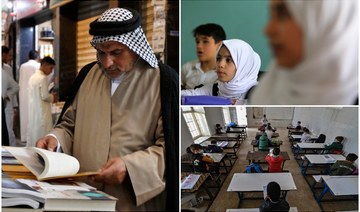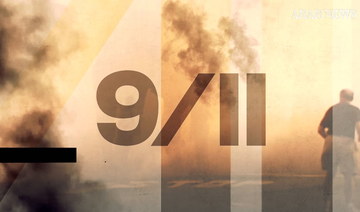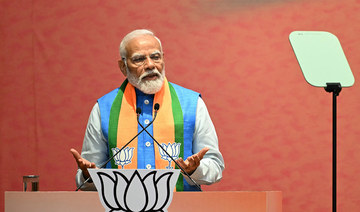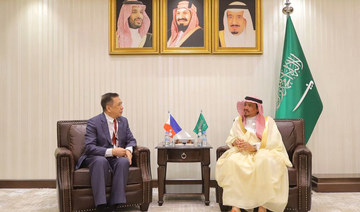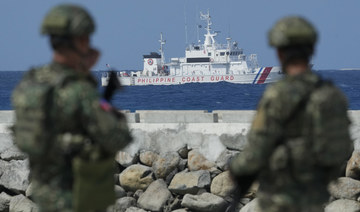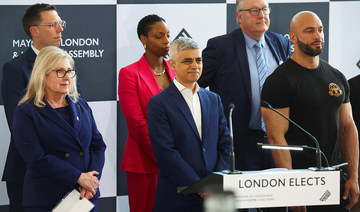WASHINGTON: Around New York City in the weeks after the Sept. 11 attacks, as an eerie quiet settled over ground zero, South Asian and Arab men started vanishing.
Soon, more than 1,000 were arrested in sweeps across the metropolitan area and nationwide. Most were charged only with overstaying visas and deported back to their home countries. But before that happened, many were held in detention for months, with little outside contact.
Twenty years later, in the aftermath of all the remembrances and memorials to the events of 9/11, little attention has been paid to the fate of these men and their families, collateral damage of a horrific terrorist act and the hysteria it spawned.
Fahd Ahmed, executive director of the immigrant advocacy group Desis Rising Up and Moving, said after the attacks, his group “started getting calls from women saying, ‘Last night, law enforcement busted into our apartment and took my husband and my brother.’ Children calling us and saying, ‘My father left for work four days ago and he hasn’t come home, and we haven’t heard anything.’”
“There were people who were just disappearing from our communities,” he says, “and nobody knew what was happening to them or where they were going.”
They were, according to the 9/11 Commission report, arrested as “special interest” detainees. Immigration hearings were closed, detainee communication was limited and bond was denied until the detainees were cleared of terrorist connections. Identities were kept secret.
A review conducted by the Justice Department’s Office of the Inspector General said its policy meant a significant percentage of the detainees stayed for months despite immigration officials questioning the legality of the prolonged detentions and even though there were no indications they were connected to terrorism.
Although many of those who were held had come into the US illegally or overstayed visas, it was unlikely they would have been pursued if not for the attack investigation, the report said.
The “blunderbuss approach” of rounding up Muslims and presuming there would be terrorists among them was “pure racism and xenophobia in operation,” says Rachel Meeropol, senior staff attorney with the Center for Constitutional Rights, who filed a lawsuit in 2002 on behalf of several of the men and continues to fight for additional plaintiffs to this day.
Yasser Ebrahim, an original plaintiff in the lawsuit, was at a shop in his New York neighborhood and noticed people intently watching the television. “I saw these images on the screen, and for a moment there was like some kind of a movie or something,” he says. “I couldn’t believe what I was seeing.”
He had been in the United States since 1992 and enjoyed his life. “I loved everything about America,” he said by Zoom from Egypt.
On Sept. 30, 2001. Federal agents showed up at his door in Brooklyn, New York. Ebrahim thought the immigration matter would be straightened out quickly, or he would be deported. He remained in custody until the following June.
For three months, his family did not know what happened to him or his brother. Even then there was little outside communication. And some officers at the facility in Brooklyn were physically and verbally abusive. It was months before he saw his brother. “There was the general feeling that we’re going to be here forever,” he says.
Ebrahim’s brother was deported first.
When Ebrahim was finally allowed to leave, he was given clothes several sizes too big and placed on a plane but without being told the destination. The plane went to Greece and after spending a night in the custody of Greek authorities, he boarded a flight for Cairo.
In 2009 he and four others, including his brother, reached a $1.26 million settlement on the lawsuit. Though not an apology, he says, “we thought it was sort of admitting that something wrong was done to us.”
Umair Anser, was 14 and living in Bayonne, New Jersey, when he and math classmates watched the twin towers fall on a classroom television.
Less than a month later he came from school and found a nearly catatonic mom and a ransacked home. His father, Anser Mehmood, was gone, along with the family’s computers.
“We didn’t know where our father was for the next three months,” Anser said.
When the family did see him again, it was a different man. “He was so weak … I couldn’t see my dad like that,” Anser said.
With their father gone, there was no financial support for the family. Anser and his brothers were bullied at school; neighbors harassed them at home. It became untenable and the family returned to Pakistan, leaving Mehmood behind, in jail.
Mehmood eventually pleaded guilty to working with an unauthorized Social Security number and was sentenced to eight months in prison. He was transferred to Passaic County Jail before finally being deported to Pakistan on May 10, 2002, where the family now lives.
Joshua Dratel, co-chair of the National Association of Criminal Defense Lawyers’ national security committee, says the detentions are a foundational piece of something troubling — an acceptance of more invasive law enforcement for protection from terrorists.
Searches at airports, in buildings, even on subways: “These are things that were once exceptional and extraordinary, and now the exception has become the norm. I think that has put us in a position of vulnerability to more of it and a more malevolent version of it.”
Shirin Sinnar, a law professor at Stanford University, says the extreme measures taken after 9/11 have been normalized to the point that “now we don’t even talk about them. They’ve just become part of the kinds of surveillance and deprivation of rights and profiling that we expect to see.”
The positive, she says: More people seem willing to challenge that.
To a degree, that is true. Attitudes have trended toward people being more wary of the government’s counterterrorism efforts.
But a recent poll by The Associated Press-NORC Center for Public Affairs Research shows that a majority of Americans, 54 percent, still believe it is sometimes necessary to sacrifice rights and freedom to fight terrorism.
The long-running lawsuit in which additional plaintiffs were added after the first five were awarded a settlement has continued. It has ricocheted through the court system with mixed results, including a 2017 stop at the Supreme Court. Last month, a federal district court judge in Brooklyn dismissed the lawsuit.
Meeropol says the initial settlement was proof that the plaintiffs had a compelling case. She says no decision has been made yet on an appeal. That leaves a striking fact: Nearly 20 years later, no individuals have been held accountable for how the detainees were treated, she says.
Ebrahim, now 49, and owner of a company that provides outsource service, including coding, to other companies, said now, he would consider bringing his teenage son to New York City to see sights and sounds that he found “charming.”
But, he has advice for US citizens: “Never twist the Constitution again. What makes America America is the freedom, and the Constitution.”
Muslims recall questionable detentions that followed 9/11
https://arab.news/2xznc
Muslims recall questionable detentions that followed 9/11

- Over 1,000 Arabs and South Asians disappeared and were later deported from the US after the 9/11 attacks
- A senior lawyer said the detentions were 'pure racism and xenophobia in operation'
Modi’s BJP skips Kashmir as Indian election enters fourth phase

- Millions of Indians across 96 constituencies began voting on Monday
- Ruling party is not fighting elections in Kashmir for first time in 30 years
NEW DELHI: India’s ruling Bharatiya Janata Party is not contesting elections in the Muslim-majority region of Kashmir for the first time in nearly three decades, as voting in the latest round of the national polls got underway on Monday.
The world’s most populous country began voting on April 19 in a seven-phase election that is scheduled to take place over six weeks, with ballots set to be counted on June 4.
India has 968 million people eligible to vote in the general election, where incumbent Prime Minister Narendra Modi and his Hindu nationalist BJP are aiming for a rare third consecutive term in power.
Monday’s voting involved 96 constituencies in the fourth round of polling.
While the BJP, which has been in power since 2014, and its allies are contesting every other part of India as they look to secure a majority of the 543 parliamentary seats, the party is sitting out in the northern Himalayan territory of Jammu and Kashmir.
This year marks the region’s first election since Modi’s government stripped the valley of its special autonomous status and statehood — which was granted by the Indian Constitution — on Aug. 5, 2019. The move unilaterally revoked the relevant provisions under Article 370, scrapping Kashmir’s flag, legislature, protections on land ownership and fundamental rights, sparking fears of demographic engineering in the region.
“It’s really surprising that the BJP, which claimed to have over 800,000 cadres in the valley, failed to find a single candidate. It shows that the BJP is not popular in the valley,” Sanjay Tickoo, the Srinagar-based leader of the Hindu minority group Kashmiri Pandit, told Arab News.
“I am expecting a record turnout to show the central government what (they) have done to the people of Jammu and Kashmir. This is the reflection of anger … no one is happy in the valley after the abrogation of Article 370.”
Indian-controlled Jammu and Kashmir is part of the larger Kashmiri territory, which has been the subject of international dispute since the 1947 partition of the Indian subcontinent into Hindu-majority India and Muslim-majority Pakistan. Both countries claim Kashmir in full and rule in part.
Modi said his government had been focusing on jobs and development as part of an effort to end violence in the valley, which has for decades witnessed outbreaks of separatist insurgencies to resist control from the government in New Delhi.
But after the BJP lost Kashmir’s three seats in the 2019 election, the party’s popularity slid further after it revoked the region’s autonomous status later the same year and subsequently imposed months of strict communication blockade and jailed hundreds of political leaders.
“The vote expresses not only anger but also apprehension against the anti-Muslim rants that have been going on as well as whatever they have done in Kashmir,” Professor Sheikh Showkat, a Srinagar-based political analyst, told Arab News.
Altaf Thakur, BJP spokesperson in Kashmir, said the party was still taking part in the Kashmir polls by supporting other regional parties.
“It is not correct to say that we are not fighting the election, we are playing the role of kingmaker and whichever way the cadres of the BJP will go, we will win,” he told Arab News.
“It’s not important whether we stand in the elections or not, the important thing is that we have to defeat the dynasty rulers,” he said, referring to the main contenders in the Kashmir polls, the National Conference and People’s Democratic Party.
While they are fighting each other in the valley, both parties have said they oppose the BJP and are part of the Congress party-led opposition alliance, known as India.
For some Kashmiri voters, Monday’s vote was about speaking up for themselves.
“The BJP knew that they cannot tolerate the wrath of the people of Kashmir. They fled the contest without a fight,” Aijaz Ahmed, a businessman from Srinagar, told Arab News.
“I voted today because it gave me an opportunity to express myself and tell the government in Delhi that you cannot keep us silenced. We want an atmosphere without fear and a region where our own identity is not questioned.”
5,000 Filipino pilgrims expected to fly to Makkah for Hajj

- Travelers ‘can expect VIP-like treatment,’ National Commission on Muslim Filipinos says
- First pilgrims will take off from Manila International Airport next week
MANILA: Thousands of Filipino pilgrims are set to travel to Makkah for the upcoming Hajj pilgrimage, the National Commission on Muslim Filipinos said on Monday, with the first batch set to leave for Saudi Arabia next week.
In the predominantly Catholic Philippines, Muslims constitute about 10 percent of the nearly 120 million population. Most live on the island of Mindanao and the Sulu archipelago in the country’s south, as well as in the central-western province of Palawan.
The commission said that nearly 5,000 Muslims had confirmed they would travel to Saudi Arabia to perform the Hajj pilgrimage this year.
“We have already processed 96 percent of the pilgrims,” Zainoden Usudan, chief of Hajj operations at the NCMF’s Bureau of Pilgrimage and Endowment, said.
“They can expect VIP-like treatment, allowing them to fully concentrate on their pilgrimage.”
Officials from the commission have been working hard to ensure that the difficulties faced by pilgrims last year will not be a problem this time around.
“This time, we are making sure that food will not be a problem,” Usudan said, referring to problems with delayed meal deliveries in 2023.
He said the commission was working with a service provider in the Kingdom that had contingency plans for all aspects of the trip, including transportation.
The first Hajj flight from the Philippines is set to take off from Manila International Airport on May 23.
One of the five pillars of Islam, this year’s Hajj is expected to run from June 14-19. Many pilgrims extend their stays to make the most of the once-in-a-lifetime opportunity to fulfill their religious duty.
Charities brand UK family reunion system for asylum-seekers ‘broken’

- New report says thousands waiting for relatives to be relocated to Britain
- Refugee Council CEO: ‘The UK has clearly failed the Afghan refugees that it promised to protect’
London: Charities in the UK have branded the country’s system for reuniting separated families of asylum-seekers “broken,” calling for the Home Office to “fix and expand” it.
A new report published by the Refugee Council and Safe Passage International has highlighted figures showing a backlog of more than 11,000 migrants in the UK waiting to be reunited with relatives during the summer last year.
Despite repeated freedom of information requests, the Home Office has not provided updated figures since then.
The report mentioned that a particular problem faces separated Afghan families, with many individuals reaching the UK but finding themselves in prolonged legal difficulty and their relatives forced to remain in Afghanistan, neighboring Pakistan or elsewhere.
Currently, Afghans evacuated from their country as part of Operation Pitting in August 2021 are prevented from automatically bringing close family to the UK.
In October 2023, the British government proposed a new system to address this issue, but the plan has yet to implemented despite pressure from MPs and members of the House of Lords.
Approved asylum-seekers can apply for a family reunification visa, but thousands find themselves stuck in a backlog of cases despite the Home Office saying the process should take under 12 weeks.
The Independent spoke to a number of Afghans, including a former pilot, struggling to be reunited with their relatives.
The pilot told the newspaper: “They (his family) have been waiting for a visa for five months in Iran, but so far there is no news from the embassy and there is no guarantee it will be issued.
“My family are facing a lot of problems. They don’t have a proper place to live, and don’t have access to a doctor, because they are living illegally.
“Their Iranian visas have expired and they need to extend them, but it is impossible. My wife is suffering mentally and emotionally, and she is completely (without hope).”
Another issue is that of unaccompanied children who, under current rules, also cannot use their status to automatically relocate their families to the UK.
The Independent spoke to one Afghan teenager, Farhad, rescued from Kabul without his parents in 2021, who faces an anxious wait to see if his family can join him in the UK.
“(The UK government) promised in 2021 that they’re going to bring the families, but it’s still been almost three years,” he said.
“My mum and my siblings are in Pakistan because they needed a doctor and medication. But my father couldn’t get the visa to go with them.
“I am doing my GCSEs this month and I can’t really focus on my studies knowing that my family is struggling.”
Safe Passage International highlighted the case of another young boy, Ahmad, who had tried to join his older brother in the UK.
Despite both his parents having died in Afghanistan, the Home Office denied that he had any “serious and compelling” circumstances to justify his asylum application.
He was only able to stay in the UK after a judge intervened, ordering the Home Office to provide assistance.
Safe Passage International’s CEO Dr. Wanda Wyporska told The Independent: “Nearly three years on, it’s a national shame that Afghans, who risked so much to support UK military operations, are still waiting for a way to bring their family to safety here with them. Their family members are living in fear every day of the Taliban.”
The Refugee Council’s CEO Enver Solomon said: “The UK has clearly failed the Afghan refugees that it promised to protect, by keeping families separated for so long with no information on how they may be reunited.
“After risking everything for the UK, Afghans and their families should not be forced to make dangerous boat journeys to get here, nor should they face hostile, inhumane policies like the Rwanda plan when they do make it to the UK.”
A Home Office spokesperson told The Independent: “We made one of the largest commitments of any country to support people from Afghanistan, and so far we have brought around 27,900 individuals to safety in the UK, including thousands under our Afghan resettlement schemes.
“In October we committed to establish a route for those evacuated from Afghanistan under Pathway 1 of the Afghan Citizens Resettlement Scheme without their immediate family members, to reunite them in the UK.
“We remain on track to meet that commitment and open the route for referrals in the first half of this year.”
Philippines to tighten guard at locations in South China Sea

- Philippine Coast Guard deploys ship to Sabina Shoal on the Spratly archipelago, where it accused China of building an artificial island
MANILA/BEIJING: The Philippines said on Monday it would keep a closer guard on reefs, shoals and islets in its exclusive economic zone in the South China Sea, alarmed by reports of new reclamation activities by China, which Beijing denied.
The Philippine Coast Guard said on Saturday it had deployed a ship to Sabina Shoal on the Spratly archipelago, where it accused China of building an artificial island, having documented what it said were piles of dead and crushed coral on the sandbars.
Jonathan Malaya, spokesperson of the National Security Council (NSC), said NSC chief Eduardo Ano had ordered a tighter guard at locations within Manila’s 200-nautical mile economic zone, as a long-standing diplomatic row with Beijing intensifies.
“No one will guard (these locations) except us. It is our responsibility under international law to guard (them) and ensure that the environment there would not be damaged and that there won’t be reclamation activities,” Malaya told a regular television program.
China claims almost all the South China Sea, including parts claimed by the Philippines, Brunei, Malaysia, Taiwan and Vietnam, and has carried out extensive land reclamation on some islands, building military facilities, causing concern in Washington and the region.
China’s foreign ministry on Monday dismissed Manila’s latest accusation as “groundless and pure rumor.”
“Recently, the Philippine side has repeatedly spread rumors, deliberately smeared China and attempted to mislead the international community, which is futile,” spokesperson Wang Wenbin told a regular briefing.
He urged Manila to “return to the right track of properly settling maritime disputes through negotiation and consultation.”
Philippine Coast Guard spokesperson Jay Tarriela said its presence at the Escoda shoal had deterred China from doing small-scale reclamation, but that scientists would have to determine whether the piles of coral were natural or man-made.
He said the coast guard was committed to maintaining a presence at the shoal, just over 120 nautical miles from the Philippine province of Palawan.
The Permanent Court of Arbitration ruled in 2016 that Beijing’s claims in the South China Sea, a vital waterway, had no basis under international law, a decision that China rejects.
The Sabina Shoal, known locally as Escoda, is the rendezvous point for vessels resupplying Filipino troops stationed on a grounded warship at the Second Thomas Shoal, where Manila and China have had frequent run-ins.
Ano has called for Chinese diplomats to be expelled over the alleged leak of a phone conversation with a Filipino admiral about the maritime dispute.
On Monday, the Philippine foreign ministry said it would look into reports of “illegal and unlawful activities” by diplomatic officials, but did not name China.
3 men charged in the UK with assisting the Hong Kong intelligence service

- The men will appear at Westminster Magistrates’ Court charged under the National Security Act
LONDON: Three men have been charged with allegedly assisting Hong Kong intelligence services and with foreign interference, London’s Metropolitan Police said Monday.
The men will appear at Westminster Magistrates’ Court charged under the National Security Act.
Chi Leung (Peter) Wai, 38, Matthew Trickett, 37, and Chung Biu Yuen, 63, have each been charged with assisting a foreign intelligence service.
“While these offenses are concerning, I want to reassure the public that we do not believe there to be any wider threat to them,” said Commander Dominic Murphy, Head of the Met’s Counter Terrorism Command.
“This investigation remains ongoing, but now that charges have been brought, I urge people not to speculate or comment further in relation to this case.”
Hong Kong’s security bureau, Hong Kong police and the office of China’s foreign ministry in Hong Kong did immediately respond to requests for comment.



